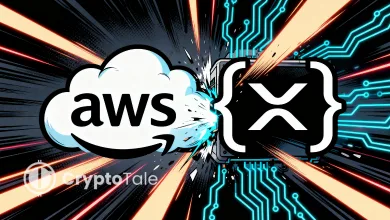Cloudflare Outage Exposes Centralized Weakness in Crypto

- Cloudflare’s outage exposed major crypto platforms’ reliance on centralized web layers.
- Upper infrastructure layers remain vulnerable despite decentralized blockchains.
- The incident renewed calls for full-stack decentralization to avoid single-vendor failures.
A Cloudflare outage disrupted internet traffic on a wide scale and exposed structural weaknesses across the crypto sector. Several major platforms went offline during the event. The incident renewed debate over how deeply the industry still depends on Web2 systems. Blockchain infrastructure teams argue that decentralization at the chain level covers only part of the stack. Upper layers remain vulnerable when a single service provider experiences failure.
The disruption affected Blockchain.com, Coinbase, Ledger, BitMEX, Toncoin, Arbiscan, and DefiLlama. Their services stalled as Cloudflare’s network problems spread across major routes. A similar chain of outages occurred one month earlier during an Amazon Web Services breakdown. That failure also interrupted a broad list of crypto platforms.
Decentralized Infrastructure to Reduce Crypto Outage Risks
EthStorage argues that focusing only on validators, consensus, and smart contracts does not protect full access. The group points to higher layers of the stack that many teams overlook. RPC, DNS, APIs, indexing systems, and storage often remain centralized. When these layers fail, users lose access even when blockchains remain operational.
According to EthStorage, resilience requires “end-to-end decentralization.” This approach distributes all essential layers so no single vendor controls access. The Cloudflare incident showed how one malfunction could impact multiple platforms at once. Strong decentralization at the settlement layer cannot compensate for centralized entry points that handle routing and delivery.
Filecoin issued a similar warning. The organization noted that the outage revealed how much traffic still flows through a handful of operators. Heavy reliance on one cloud provider limits societies that depend on stable access to data. The group views decentralized storage as a necessary step for reducing systemic exposure.
Teams at EthStorage, Protocol Labs through IPFS and Filecoin, and Arweave are developing decentralized HTTP and storage alternatives. These systems aim to provide independent access paths when large networks fail. They also aim to reduce the risk of widespread disruption triggered by centralized infrastructure.
EthStorage observes that many crypto teams continue using centralized frontends because they are simple to set up. Developers often believe decentralized tools are slower or harder to manage. According to the group, these views no longer match current performance levels. Rapid launch cycles and early user growth often take priority, pushing decentralization into later stages.
Hidden Infrastructure Gaps Increase Crypto Outage Risks
The group notes that users rarely see backend systems. As a result, infrastructure decisions receive less attention during early development. This delays decentralized upgrades and leaves protocols exposed during major outages. Recent failures showed how hidden dependencies could create broad access issues across the ecosystem.
EthStorage emphasizes that full decentralization could be reached through gradual steps. Projects could remove centralized components one layer at a time. Teams could align their roadmaps with long-term decentralization goals. Reducing dependency across execution, storage, and access layers could occur without large disruptions. Each improvement strengthens overall resilience.
Related: Buterin Sees Risk of Ethereum Being Shaped by Wall Street
Removing centralized elements lowers the risk of total service loss during outages. It also gives teams more control over critical infrastructure and long-term reliability. Incremental changes provide a clear path toward stronger independence.
Ethereum co-founder Vitalik Buterin reinforced this issue last week. In a “Trustless Manifesto,” he warned against weakening decentralization for easier adoption. He argued that trustless qualities diminish once hosted nodes or centralized relayers enter the system. Each addition becomes a potential chokepoint. Ethereum Foundation researchers Yoav Weiss and Marissa Posner echoed this view.
The Cloudflare outage intensified pressure for deeper architectural independence. Infrastructure groups view the incident as proof that the ecosystem must decentralize more than the chain itself. Outages would continue to disrupt platforms until teams reduce reliance on centralized web layers.




